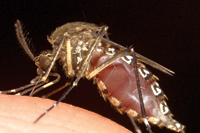CQ WEEKLY – VANTAGE POINT
April 28, 2012 – 9:32 p.m.
Florida Greens Say Mosquito Plan Stings
By Shawn Zeller, CQ Staff
Environmentalists are urging the Florida congressional delegation to intervene before officials in the Florida Keys proceed with a novel experiment in mosquito control.

|
||
|
Concerned about the resurgence of dengue fever in South Florida, the Florida Keys Mosquito Control District wants to release a genetically modified version of the Aedes aegypti mosquito, best known for carrying both yellow fever and dengue fever. Dengue causes a high fever and a nasty rash lasting a week or more. Yellow fever can be deadly.
The genetically modified mosquito, developed by the British firm Oxitec, breeds with the local Aedes aegypti, producing offspring that die before reaching maturity.
At least that’s what the company’s research shows. But environmental groups, including Friends of the Earth and the Sierra Club, worry that introducing what essentially will be a new species could have unforeseen consequences.
“We don’t want to be used as human guinea pigs,” says Trish Sheldon of the group GMO-Free Florida, which signed a letter protesting the experiment.
Sheldon worries that introducing more mosquitoes could accelerate the spread of dengue or cause yellow fever. She notes that Oxitec acknowledges that its plan is not 100 percent successful. It says that about 3 percent of the genetically modified mosquitoes do breed successfully.
Michael Doyle, the executive director of the Florida Keys Mosquito Control District, says he wants to assuage the environmentalists’ concerns. He’s asking the federal government to sign off on the project, though he says he’s had trouble finding any agency willing to take on the task. In November, the Agriculture Department said the issue wasn’t within its jurisdiction even though the department in 2007 signed off on the release of a sterile pink bollworm in Arizona to help eradicate that pest, which attacks cotton crops.
The Centers for Disease Control and Prevention reported in 2010 that after years with no cases, the Keys saw 28 Dengue fever infections in 2009 and 2010. In response, the Florida Keys Mosquito Control District increased its spraying and warned residents to dump standing water where mosquitoes breed. Last year, Doyle says, there were no new cases. But he worries the disease may return without Oxitec’s mosquitoes. “We have other tools,” he says, “but none of them is effective enough.”